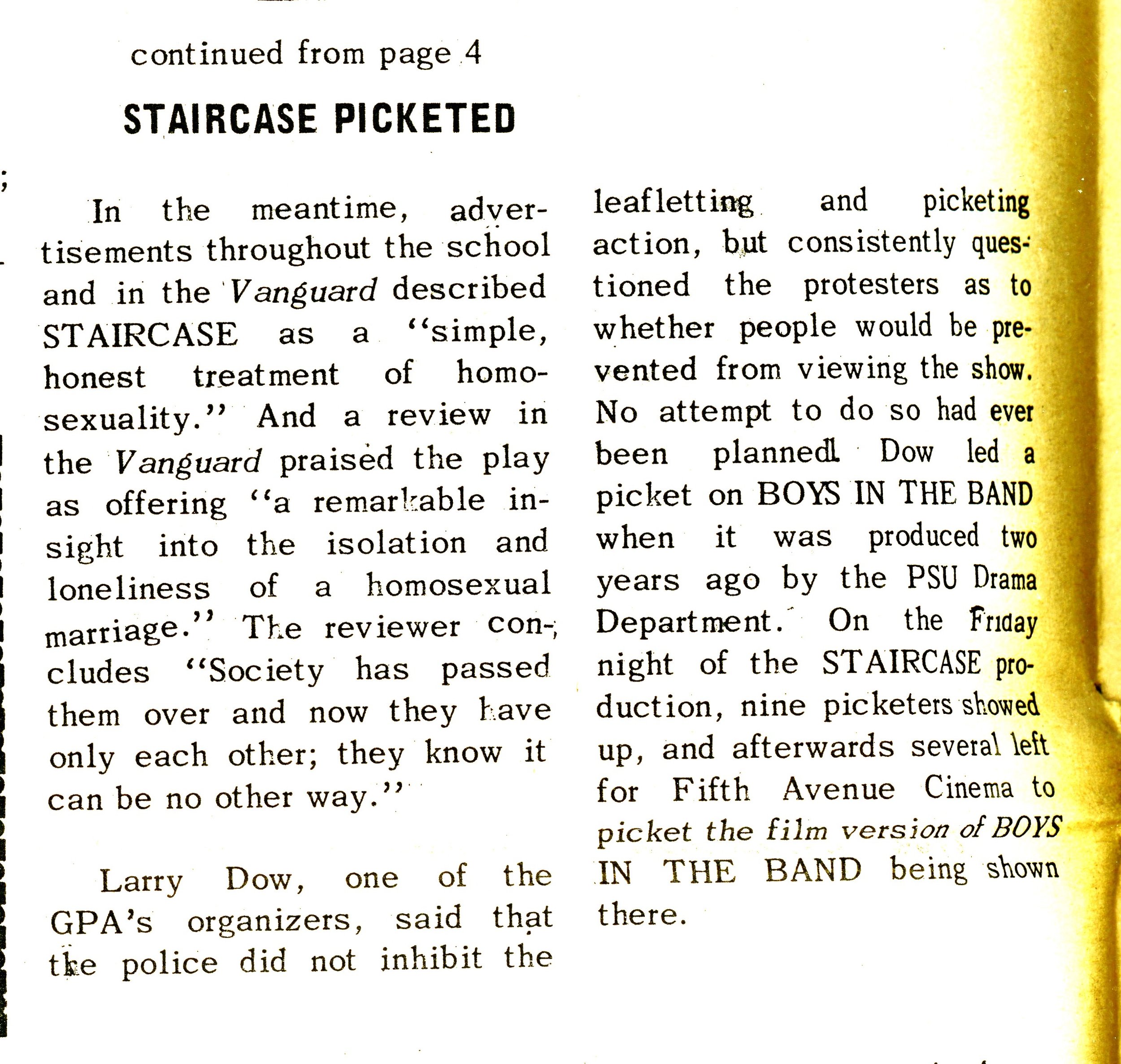PSU - THEATRE DEPARTMENT
Note: Portland State University theatre department appears to be the first place that an openly gay play was produced, that was Boys In The Band, 1971.
Portland State University – Portland State Players
In 1967 a group formed and began producing ‘professional’ plays at Portland State University under the direction of Tom Hill and his wife Anne Gerety. Tom was a professor at PSU and the company was started as “Professional Theatre Resident in Portland.” The company’s name was The American Theatre Company or ATC. In 1970, Tom’s contract with PSU ended and so did the company’s residency at PSU. Soon they found a storefront space and christened it Storefront. That company would go on to do many gay-themed or out shows.
Through research, Boys in the Band produced at Portland State University by the Gay Men’s Student Union which existed for a short period of time at PSU per an article in the December 1972 page 16 of The Fountain. The play while produced at PSU received a lot of backlash from what the paper calls “gay liberation group”. The open letter in The Fountain stated the group as Gay Liberation.
The play was directed by Jack Featheringill. Per an article in Oregon Arts Watch [https://archive.orartswatch.org/tag/jack-featheringill/] “In his young days as a Broadway hoofer he’d danced for George Balanchine and a lot of other legends. Look him up online – he danced under the name Jack Leigh – and you’ll see he had a hand (and two feet) in a lot of important Broadway history. He danced or sang or both in, among others, “On Your Toes,” “Li’l Abner,” “Ziegfeld Follies of 1957,” “How To Succeed in Business Without Really Trying,” and the lovely, underappreciated musical “She Loves Me.” He was a River City resident in the original “Music Man,” and danced with Marian the Librarian in the movie version. He danced with Ethel Merman and Judy Garland. He also did a lot of stage managing, and he cast the original Broadway production of “Fiddler on the Roof.”
Not that you’d hear him talk much about it. He was proud of those days, but he didn’t dwell on them. In Portland, he was known as a great teacher, an innovative director, and an entrepreneur within the constraints of a public university system. He made PSU’s theater department a center for summer stock, with a long run at the Coaster Theatre in Cannon Beach and, later, with a string of vibrant summer shows at PSU’s Lincoln Performance Hall. He knew art and he knew entertainment, and he was adept at finding that sweet spot where the two come together and kiss. Tennessee Williams, Sam Shepard, Jean Anouilh, Georges Feydeau – his tastes were broad and sophisticated. For more than 30 years he was an essential figure on the Portland theater scene, insisting on professional standards and encouraging the best from his students. Many of them – those who didn’t move on elsewhere – in turn became stalwarts of the Portland stage. They’re still here, acting with or directing or teaching a new generation. Jack died on July 3, 2013.
Note: “Boys In The Band” was produced three times by three different theatres; PSU Theater Department in 1971, Slabtown Stop in 1974, and then Portland Civic Theatre in 1981.
Below is an article about “Boys In The Band” in The Oregonian April 30, 1971.
This wasn’t the only play that caused controversy. In 1973, Staircase the 1969 play by Charles Dyer was presented. This time the play was presented by the Portland State University Drama Department.
Per Wikipedia: Staircase is a two-character play by Charles Dyer about an aging gay couple who own a barber shop in the East End of London. One of them is a part-time actor about to go on trial for propositioning a police officer. The action takes place over the course of one night as they discuss their loving but often volatile past together and possible future without each other.
Below Left is the 1969 movie poster and Below Right is an article from the February 1973 issue of The Fountain newspaper.
Above is from The Fountain May 1971
The Fountain newspaper – June 1971 Vol 1, No. 4 allowed the Portland State Men’s Student Union to address the debate.







